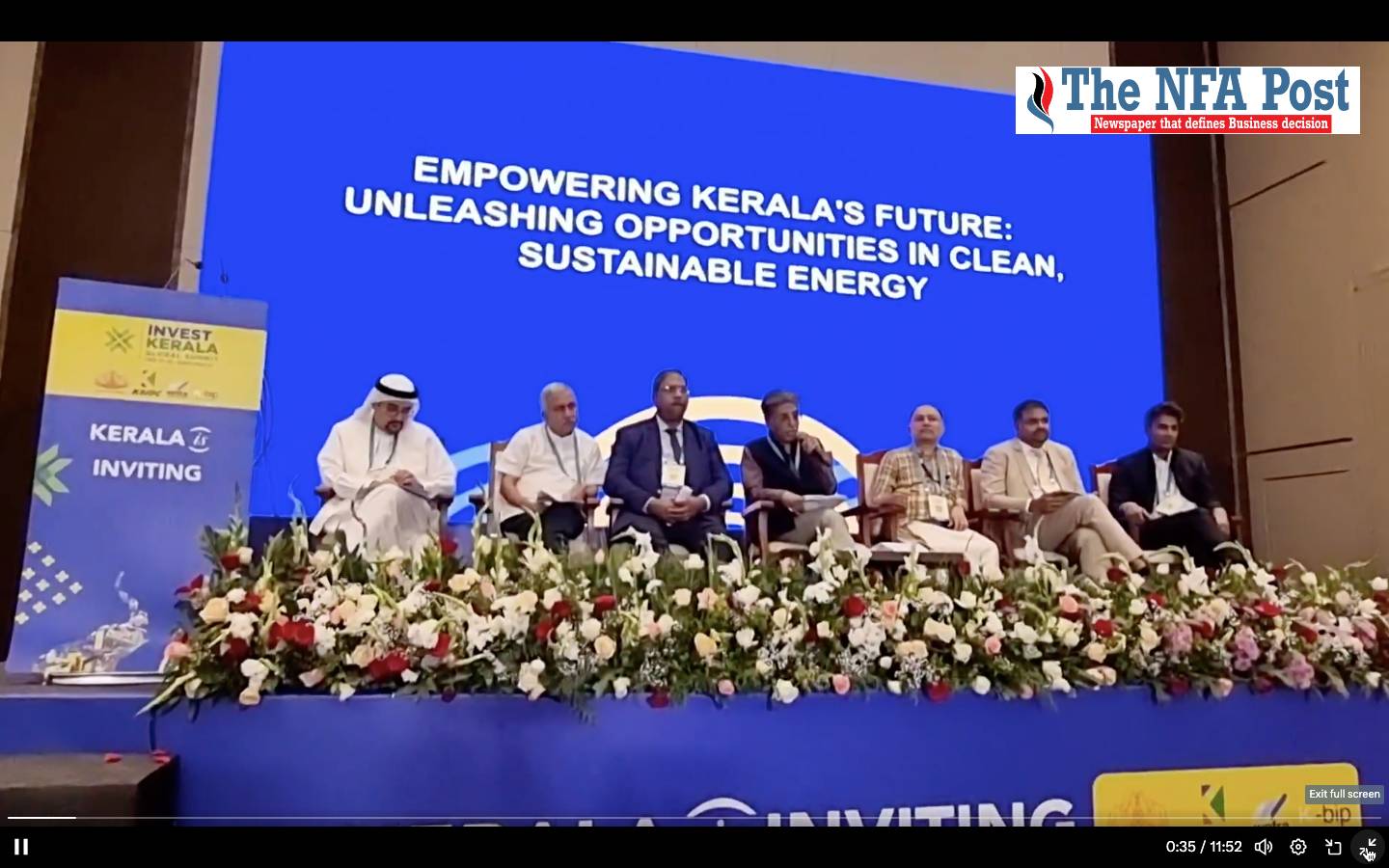Financial Express Executive Editor K G Narendranath moderated the panel discussion where the focus on the nation’s commitment to achieving net-zero carbon emissions.
The panel discussion gave importance on cost-effective energy storage and the potential for microgrid implementation in small villages
Kochi, NFAPost: As a major shift into sustainable energy has become a global compulsion, Kerala has the potential to emerge as the clean energy powerhouse of India going by its core strengths reinforced by government policy initiatives, experts said at Invest Kerala Global Summit (IKGS) 2025.
Participating in a session on Empowering Kerala’s Future: Unleashing Opportunities in Clean and Sustainable Energy,’ the panelists said the sustainable transformation into clean energy will yield both economic and environmental benefits down to the local community level.
Delivering the key-note address on the topic, Tata Power Renewable Microgrid Ltd CEO Manoj Gupta said it is important to reduce cost of generation, transmission and distribution through strategic planning to make a profound transformation into clean energy.
“Holding that village community can play a critical role in clean energy transition, I feel the state policies and private participation need to adopt a decentralised approach. Organic and agricultural wastes abundantly available in villages could be sources of clean energy which will add value to the farming activities of village communities, besides reducing stress on environment,” said Tata Power Renewable Microgrid Ltd CEO Manoj Gupta.

The session was moderated by Financial Express Executive Editor K G Narendranath focused on the nation’s commitment to achieving net-zero carbon emissions. He emphasized that carbon emissions are not solely the responsibility of one country and discussed the mission to reduce carbon compounds.
Setting the tone for the discussion, Financial Express Executive Editor K G Narendranath said when the whole world is talking about clean energy Kerala cannot stay back since it enjoys great scope to be a frontline state in this transition.
“The surge in energy demand in the country made a compelling case for facilitating a great leap towards clean energy since increased dependence on thermal power is fraught with consequences, especially in the context of climate change. A major transition into clean energy, however, has challenges like reducing the cost and loss during generation, transmission and distribution stages,” said Financial Express Executive Editor K G Narendranath.
He also highlighted the progress of the thermal power sector, the role of renewable energy sources such as solar, wind, biomass, and bio-energy, and the intermittent nature of these sources.
“Here we have to find the importance of cost-effective energy storage and the potential for microgrid implementation in small villages. I strongly belive that Kerala should discuss the concept of a green valley in the state and explore the feasibility of using cow dung and husk for biogas production, which can also yield organic manure,” said Financial Express Executive Editor K G Narendranath.
Energy Management Centre Ltd Director R Harikumar said though Kerala has been a prime-mover advantage in generation and consumption of solar energy, it still remains a small percentage of the state’s total energy consumption.
“The state holds a lot of potential in developing Urban Micro Grids tapping renewable energy sources considering the increase in energy needs caused by the building boom. Also, this is vital to make the state energy resilient, considering the recurrence of disasters,” said Energy Management Centre Ltd Director R Harikumar.

Ciel & Terre India MD &CEO Deepak Ushadevi said Kerala needs to tap floating power potential side by side solar.
“Since availability of land is a big issue in the state, floating power plants could be leveraged as a sustainable alternative,” said Ciel & Terre India MD &CEO Deepak Ushadevi.
Australian High Commission Counsellor (Industry, Science and Resources) Sanjiva De Silva said the India-Australia Partnership in Renewable Energy is a major initiative from which both the countries benefit.
“I want to highlight the renewable energy partnership launched by the Prime Ministers of India and Australia and the already a solar training academy initiative is in the offing. Here I also find investment opportunities in the lithium market, which is a multi-billion-dollar prospects. We are also have a project involving skill enhancement courses in Australia and a startup initiatives in Gujarat aimed at empowering women and children,” said Australian High Commission Counsellor (Industry, Science and Resources) Sanjiva De Silva.
REC Ltd Director Narayanan Thirupathy said while making a major transformation into renewable energy it is also important to create a pool of skilled professionals,.
“I find that funds will not be a constraint in making a transition into clean energy. The Government of India has made substantial budgetary allocations to support the clean energy initiatives. Besides private investment, the domain also promises great scope for sustainable public-private partnership for a state like Kerala,” said REC Ltd Director Narayanan Thirupathy.
Sharaf Group UAE Vice Chairman Major General Sharafuddin Sharaf said augmenting clean energy generation is vitally important since the energy consumption has gone up uncontrollably around the world.
“Here I want to praise Kerala’s understanding and efficient use of renewable energy. This is supported by the state’s high literacy rate. I am interested in collaborating with India on renewable energy initiatives. Sharaf Group has successfully promoted integrated energy-saving systems in its various verticals,” said Sharaf Group UAE Vice Chairman Major General Sharafuddin Sharaf.
The discussion extended to waste-to-energy concepts and income-generation opportunities. The audience raised concerns about the growing number of electric vehicles and their increasing electricity demands, as well as the substantial power requirements of urban areas.
Kerala’s proactive approach in promoting rooftop solar panel installations was highlighted, with calls to further advertise and encourage their adoption. Despite Kerala being the second-largest state in rooftop solar installations, only 2% of households have adopted the technology, prompting suggestions to learn from Gujarat’s successful model.
REC’s potential to provide long-term loans for renewable energy projects was acknowledged as a key factor in boosting investments. Additionally, Kerala’s rich vegetation and abundant water bodies were identified as valuable resources for biomass energy production and floating solar panel installations, respectively.















